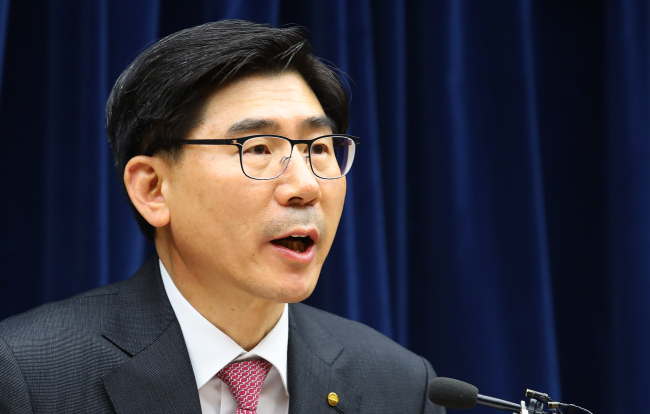Recently privatized Woori Bank said its outside directors decided Wednesday to renew the term of its current CEO Lee Kwang-goo, who led the bank’s long-awaited privatization along with strong earnings last year.
He beat two other candidates -- Lee Dong-gun, an executive vice president and head of the bank’s business support group, and Kim Seung-gyu, a former vice president of the bank’s management support unit -- after a series of interviews by the outside directors.
 |
Woori Bank CEO Lee Kwang-goo speaks at a press conference at the bank’s head office in Seoul on Wednesday. (Yonhap) |
Lee, who renews his two-year term, still needs approval at a general shareholders meeting on March 24.
The five outside directors, recommended by Woori’s new shareholders in December, concluded that Lee was well-suited for dealing with the bank’s internal affairs under an autonomous management system, as the bank was recently privatized, Woori officials said.
Lee’s contribution to the bank’s privatization after four failed attempts in 16 years, as well as the bank’s strong earnings last year, have helped him regain the CEO post, industry officials said. Lee took office on Dec. 30, 2014.
The bank’s combined net profits in the first nine months of 2016 rose 31.6 percent on-year to 1.1 trillion won, according to the company’s public regulatory filing.
In 2016, the stock price of Woori Bank surged to 13,500 won on Dec. 20 from 8,220 won on Jan. 26.
After being named as the next CEO, Lee vowed to come up with new employee evaluation system by June to boost business efficiency in a press conference.
“I will set up a task force consisting of Woori officials and outside consultants to make a new guideline for the bank’s workforce structure, promotion and merit-based payment system by June this year,” Lee said.
He also hoped that the bank could transform itself into a financial holding company to easily raise capital for merge and acquisitions of other financial firms.
Although Woori Bank’s 10.5 percent Bank for International Settlement (BIS) capital ratio already meets the Basel III requirement to be implemented by 2018, Lee will push it up by 0.5 percent point per year by targeting 1.3-1.4 trillion won in annual net profit, Lee said.
The BIS capital ratio, gauging a bank’s core equity capital to its total risk-weighted assets, shows the bank’s financial health.
Lee also said Woori Bank would seek business partnerships with securities and insurers owned by Woori’s new shareholders in Southeast Asia, where the bank has a relatively strong network.
Woori Bank became virtually privatized as of Dec. 1, with the Korea Deposit Insurance Corp. selling its 29.7 percent stake in the bank to seven firms for 2.4 trillion won. The companies were Tong Yang Life Insurance, Mirae Asset Global Investments, Eugene Asset Management, Kiwoom Securities, Korea Investment & Securities, Hanwha Life Insurance and IMM Private Equity.
The KDIC still owns a 21.4 percent stake in Woori Bank.
The bank’s five outside directors are Ro Sung-tae, former president of the Korea Economic Research Institute; Park Sang-yong, former chairman of the Public Fund Oversight Committee; Shin Sang-hoon, former CEO of Shinhan Investment Corp.; Chang Dong-woo, currently CEO of IMM Investment Corp.; and Tian Zhiping, former head of ICBC Middle East.
Born in Cheonan in South Chungcheong Province in 1957, Lee majored in business management in Sogang University and entered the then-Commercial Bank of Korea in 1979.
By Kim Yoon-mi (
yoonmi@heraldcorp.com)






![[Exclusive] Hyundai Mobis eyes closer ties with BYD](http://res.heraldm.com/phpwas/restmb_idxmake.php?idx=644&simg=/content/image/2024/11/25/20241125050044_0.jpg)
![[Herald Review] 'Gangnam B-Side' combines social realism with masterful suspense, performance](http://res.heraldm.com/phpwas/restmb_idxmake.php?idx=644&simg=/content/image/2024/11/25/20241125050072_0.jpg)
